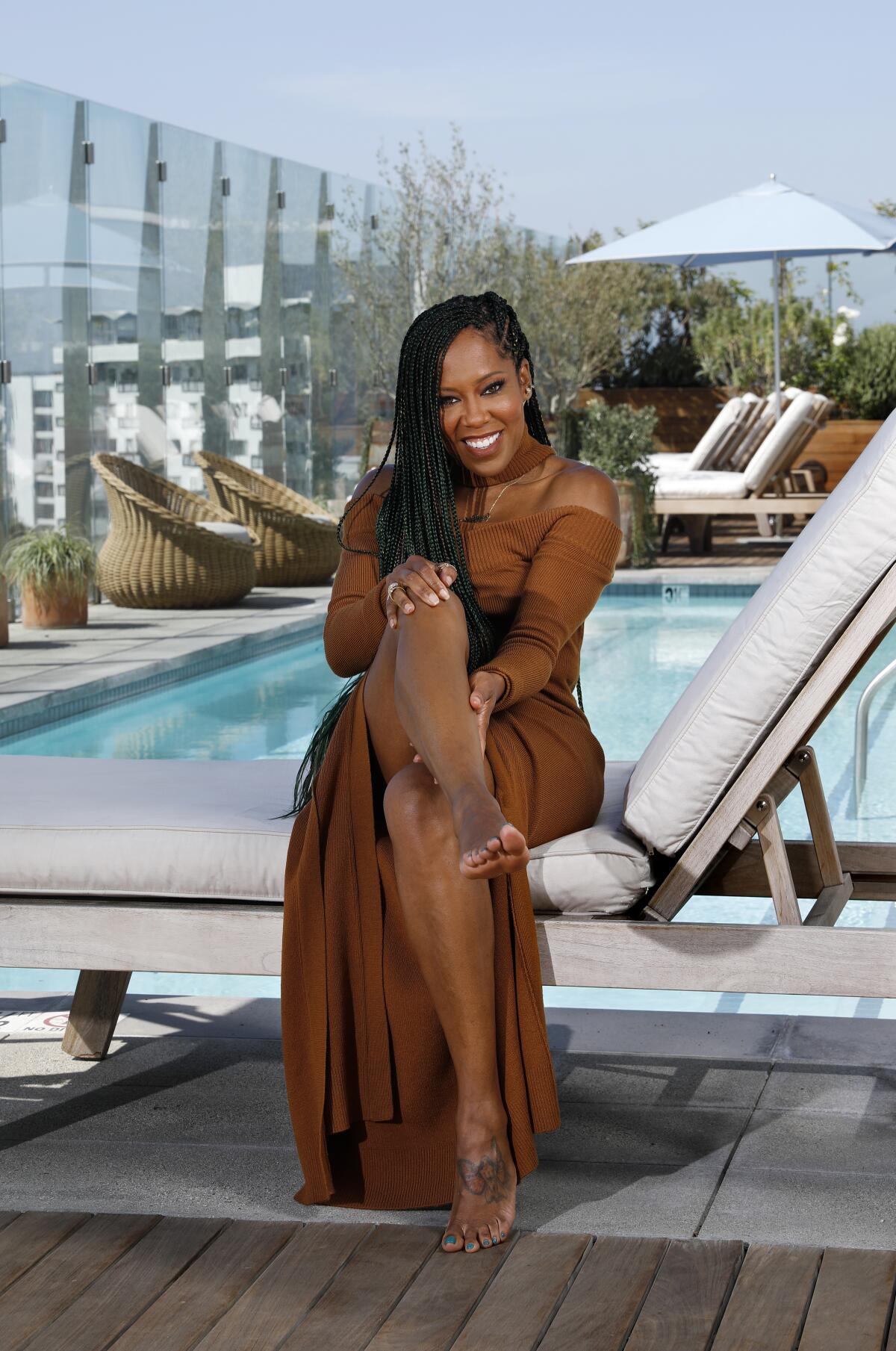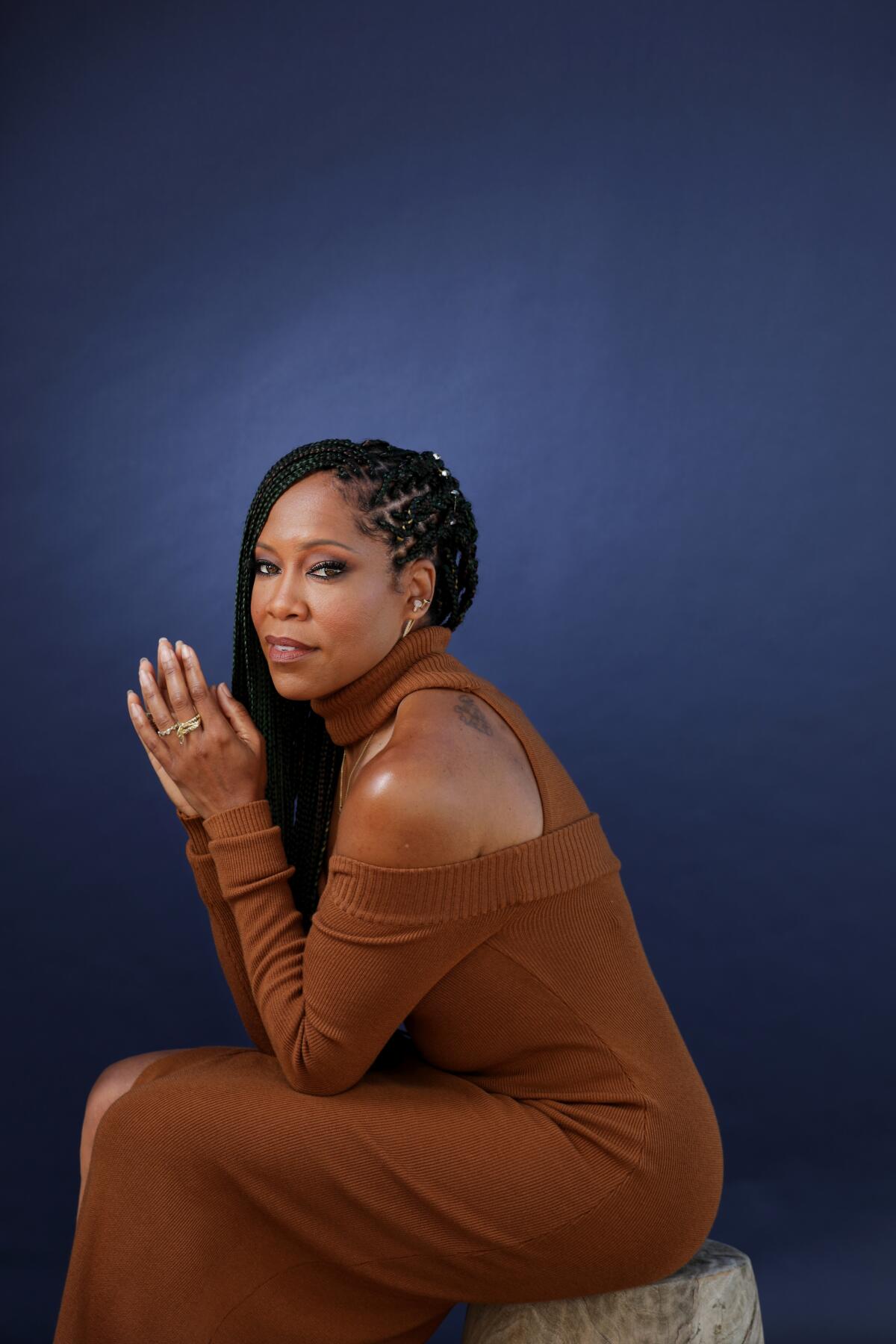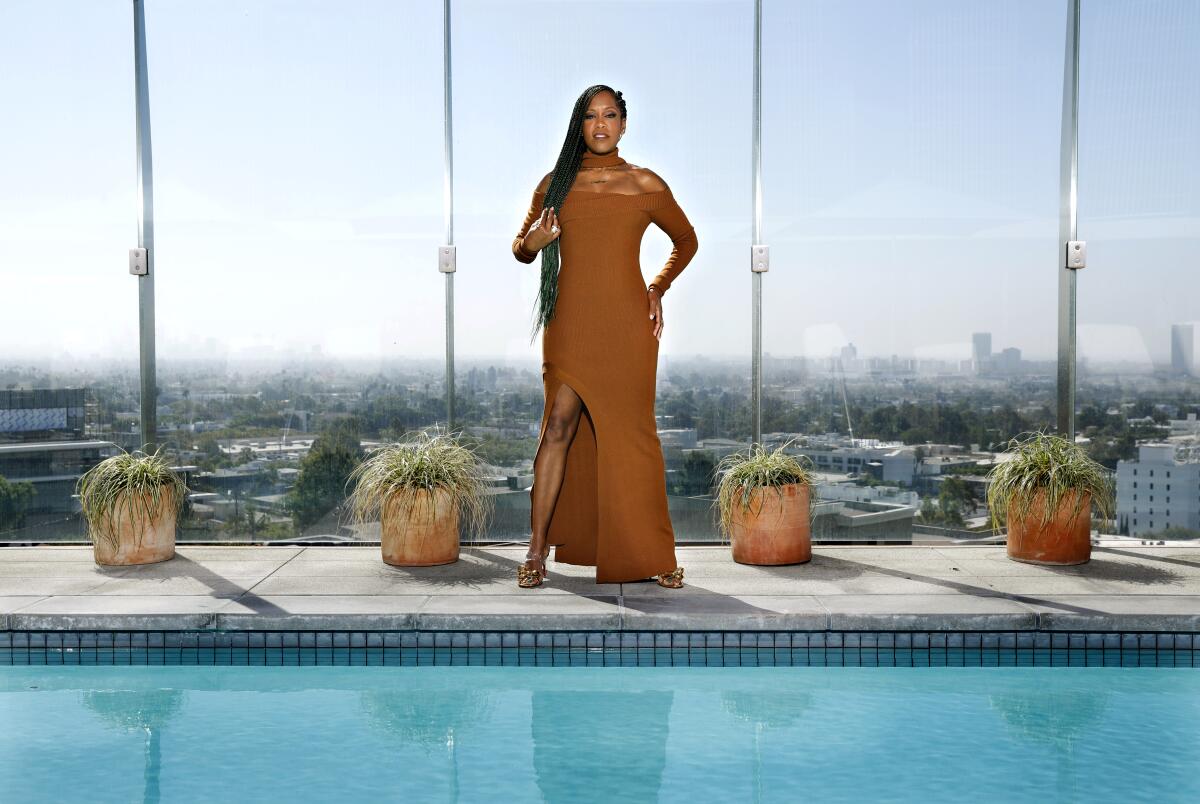For Regina King, her ‘Watchmen’ role is inspired by ‘every Black woman that ever was’

- Share via
Regina King has won three Emmys for playing three different characters, and now she’s up for a fourth for the greatest role of her career, Angela Abar, the Tulsa police detective known as Sister Night in HBO’s “Watchmen.” As “Watchmen” scored a leading 26 nominations and King plays the show’s swaggering protagonist, a role that asks her to shuttle between lover, mother, friend and imposing foe, it’s not a stretch to think she’s going to make room on her mantel for another trophy.
Right now, that’s far from her mind. It’s Sunday morning, the coffee’s brewing and Earl, her German shepherd-Akita puppy, is barking, wanting to go outside. King is putting the finishing touches on her feature film directorial debut, “One Night in Miami,” a fly-on-the-wall, fictional depiction of a real event — the night Cassius Clay, Malcolm X, Sam Cooke and Jim Brown met in a motel room after Clay (shortly before he took the name Muhammad Ali) beat Sonny Liston for the heavyweight boxing title. The movie will premiere next month at the Venice Film Festival.
“We felt like we had to get this movie done and out there because we’re in a moment where people might be open to what it has to say,” King says. “We’re having deeper conversations about race right now and I’d like to see those conversations move toward actionable things. Maybe this movie might help move the needle in that direction.”
We’ve talked in the past about how you often have someone in mind when you build the blueprint for a character. Did you have someone in mind with Angela on “Watchmen”? Because there’s a lot going on with that woman.
I did not have anyone in mind. And you’re right, I normally do. I think [“Watchmen” creator] Damon [Lindelof] gave me a gift telling me I did not have to read the comic book. That allowed me to tap into all those things I think are just wonderful about being a Black woman. I know I’m going to get a lot of backlash for this, but that term “Black Girl Magic” ... it’s not my favorite thing that people use to describe the accomplishments and wonderful things that Black women do. Because it’s not magic. It’s actually work! It’s carrying the load. And that load is heavy.
With Angela, I asked: What is she doing to make sure she’s being loved on? And what is she not doing? She has created this little protective bubble that is always in jeopardy of being burst. A lot of people can relate to that, but it’s specifically the experience of a Black woman.
HBO’s “Watchmen” examines race, white supremacy and police brutality. Sunday night’s series premiere has creator Damon Lindelof asking, “Should we have done it?”
The history of what Black women have done: birthing children that they never got a chance to mother or could never show in public that they were their mother. Clean the toilets and cook for the people that raped them and took them away from family, but still managing a smile and loving on that child that was a product of rape. That’s not magic. That’s remarkable. But a lot of pain is inherited and carried. Obviously, I’m thinking this through as I’m talking to you, but I guess the blueprint that was the inspiration for Angela was probably every Black woman that ever was. [Laughs] You know what I mean? We go on a journey.

You’ve also told me that you always put a little of yourself into every character, and I was going to ask about that with Angela, but I think you just answered that question!
When I say every Black woman that ever was [laughs], it definitely includes me. But also, more specifically, just being very private is definitely something that’s in Angela that is so me. Sure, I have a circle that I confide in. But I’ve been lucky enough to have been in the business for 30 years and feel like I’m relatable to people, but I haven’t had to give up too much of my personal life. That gives me a sense of security and safety, a place where I can just be that has allowed me to enjoy my journey as an artist and still feel like I can do regular stuff.
Every now and then, I’ll run into somebody who just cannot believe that I’m in Costco. Or can’t believe they see me in the 99 Cents Store. I like to pick out my own s—. I don’t like somebody else to do it for me. I’m a bit of a control enthusiast. If you come back from the 99 Cents Store with medium or hard toothbrushes and not soft, I’m like, “I should have just went myself.” Or I feel like if I’m giving directions sometimes, I’ll get specific — I am that person — and I’m thinking, “I see what your face is doing, so I’ll just do it myself.” [laughs]
I mean, you were born to be a director. But when did it settle in your mind that you could be a director?
It was once “Southland”came along and [producers] John Wells and Chris Chulack put me in the space of being a collaborator. It took me to have that experience where I wasn’t just an actor for hire to go, “Oh, my God. This is what it’s all about.” From that point on, if I didn’t have good chemistry with the creator, I wouldn’t do it.
And like you say, sometimes you feel like you need permission. It was John Wells, Chris Chulack, Paris Barclay and John Singleton — ironic that it’s all men — who gave me that vote of confidence. It was life-changing. It allowed me to say out loud, “I want to be a director” — and not just to my sister. [laughs]
Mentioning your sister reminds me that you and she had wanted to make something about the Tulsa race massacre for, what, eight years now? What was it like to open up the “Watchmen” script and there it was in the opening scene?
You know how you can be reading or watching something and your heart starts beating fast? With this, I get to Page 3 and I closed the script really quick. “Is Damon really about to dig into Black Wall Street? Whoa.” I just stood up and looked at the script and then sat down, started reading again and thought, “Oh. Not only is this the entry point, he’s doing it in a way that is going to bring people in who would immediately decide not to watch if they knew it was going to open that way. But because they’re all ready to watch “Watchmen,” they’re like, “What the f— is going on?” and start Googling while that episode is on.
Is that your hope with “One Night in Miami”? Because it’s going to be an entry point for some people in learning about these men.
It’s a love letter to the Black man’s experience in America. They’re unique. I mean, they’re deities. But here, they’re just talking about their fears and concerns and being vulnerable and honest. And unfortunately the conversations they’re having in 1964 are the same conversations that men like them, Black men period, are having right now. So it serves as a reminder: We may not have been alive then, but this has been going on since Africans were ripped from their country, ripped from their families and brought here, basically, to build this country.
His body was found slumped in the doorway of a sleazy tryst stop, his back resting against a desk--no pants, one shoe--a bullet through his heart.
Malcolm X and Sam Cooke were killed within a year of when the story takes place. Does death — and the fear of violence perpetrated against Black men — hang in the air in the film?
I feel like I don’t want to say. I don’t want to give it away. But you know, we started this movie in January and when the COVID hit us, we felt like, “All right. Maybe we won’t push to try to finish.” Then George Floyd and Breonna [Taylor] happened and just all the other people who have been killed and the calling the cops on Black people, and we decided we had to get this done right now because we’re in a space where white people are saying, “Yeah, I would hear Black people cry out, but I would never hear it.”
What do you think changed?
There was something about that police officer [kneeling on George Floyd] looking into the camera, like, “I don’t give a f—” that struck something in people that aren’t Black, hearts that never were touched before because all the videos that were out before, you never got to see that. Whereas, just being Black in America, we’ve looked that in the eyes at some point in our lives. Some of us, several times in our lives. So we knew that. But people who had never seen that before, who never had a Black friend in their lives who could articulate it in the way you saw it in that man’s eyes, it cracked something open and made them realize, “OK, yes. My circumstances are quite different than yours, and I’m willing to say that out loud now.”
Have all these things changed you in the past several months? I mean, it’s been a bit of a year.
Look, I’ll be honest and take ownership about how I’ve been guilty of not saying something. A couple of times, I’ve had a white friend, a dear friend of mine, say something, and I think, “Ooooh. If you understood the Black experience you wouldn’t say that.” But I just didn’t want to have the conversation.

So what this recent moment did for me — while I’ve been very much aware of the relationship between Black people and police all my life and have shed so many tears in the past five, six years of murders that have been caught on camera — this moment for me was, “No. It’s my responsibility as well to call my friend out on something she’s saying that she doesn’t realize was offensive or naive.”
And a moment did come up, since George Floyd, and it was a very emotional moment for both of us. It got a little heated, but it was a teaching moment for both of us that we will take and spread. I just say that to say we have a lot more to do than just have conversations. They need to be uncomfortable conversations with the people we never would have had conversations with.
Is your son [Ian, 24] still living with you? During all this quarantine, being a parent to an adult child — and I’m speaking from experience — can be challenging in terms of mask-policing and “Who are you seeing and are they wearing a mask?” and all that stuff.
He is, and he’s not really going out — just once after a hike with friends when they were starving. We are at the point now, “Yeah, Mom, about time for me to move out, you know.” I get it. It’s good. But with this whole pandemic, I’m glad he hadn’t moved out before. We have been spending so much time together these past six months, and it’s been a confirmation that I really like the human being my son has become.
Last time we talked, you said you felt lucky to have a grown-up child you actually like to spend time with.
I may have thought that because I wasn’t seeing him all the time! [Laughs] Now, it’s confirmed! I really do! That wasn’t a false idea. He just makes everything better.
More to Read
The complete guide to home viewing
Get Screen Gab for everything about the TV shows and streaming movies everyone’s talking about.
You may occasionally receive promotional content from the Los Angeles Times.







